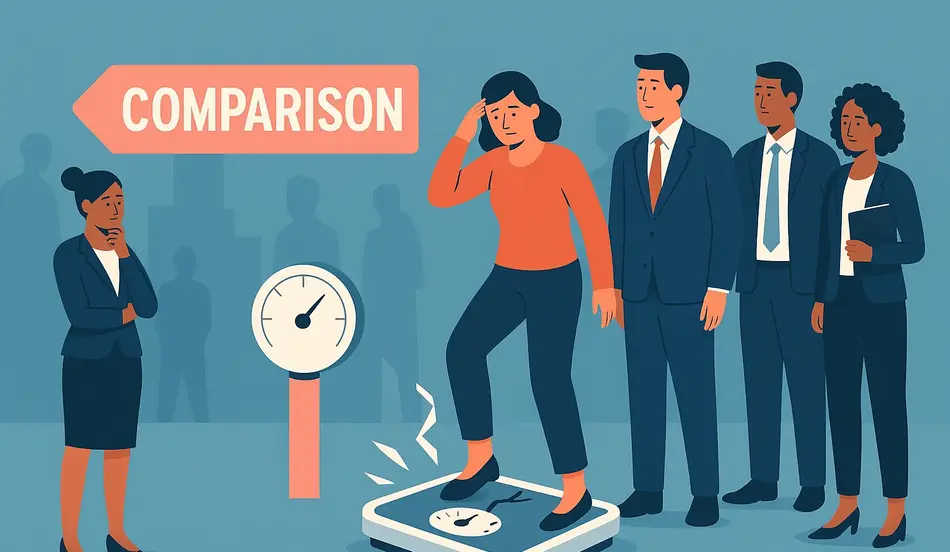Introduction: The Hidden Career Killer You Need to Stop
In today’s hyperconnected world, career comparison anxiety has become an epidemic affecting professionals across all industries. The constant exposure to others’ achievements through social media, industry news, and professional networks creates a toxic cycle of self-doubt and diminished confidence. As career coach Kesha Cameron explains, “I know the death of sitting around comparing yourself to others, especially in the creative field.”
This destructive habit doesn’t just impact your mental health—it directly sabotages your career progress, creativity, and ability to make confident decisions about your professional future.
Understanding the Psychology of Career Comparison
Why We Compare Ourselves to Others
Career comparison anxiety stems from several psychological factors that are hardwired into human behavior:
Evolutionary Roots:
- Social comparison as a survival mechanism
- Need to assess our position in the hierarchy
- Fear of falling behind in competitive environments
Modern Triggers:
- Social media’s highlight reels
- Industry awards and recognition
- Professional networking events
- Colleague promotions and achievements
The Entertainment Industry Effect
In creative fields like entertainment, career comparison anxiety is particularly intense. As Cameron notes, “It’s very easy to get caught up in who’s booking what job or winning what award or who’s stunting on the gram quite frankly.”
Why Creative Professionals Struggle:
- Non-linear career paths create confusion
- Success is highly visible and public
- Industry recognition is subjective
- Competition is fierce and global
The Three-Step Solution to Career Comparison Anxiety
Step 1: Recognize You’re Comparing Yourself
The first step in overcoming career comparison anxiety is simple awareness. Cameron advises, “First, just recognize you’re comparing yourself to other people. Sometimes just the awareness can help you slow the thoughts down.”
How to Practice Recognition:
- Notice when comparison thoughts arise
- Identify the triggers (social media, industry news, etc.)
- Acknowledge the feeling without judgment
- Understand where it sits in your body
Physical Awareness Techniques:
- Pay attention to tension in your shoulders
- Notice changes in your breathing
- Feel the sensation in your stomach
- Recognize the energy drain
Step 2: Remember Their Path is Not Your Path
The second crucial step is internalizing that everyone’s journey is unique. “Their timeline is not your timeline,” Cameron emphasizes.
Why This Matters:
- Different starting points and resources
- Varied opportunities and circumstances
- Unique skills and strengths
- Individual life circumstances
Reframing Your Perspective:
- Focus on your unique value proposition
- Celebrate your individual achievements
- Understand that success looks different for everyone
- Recognize that timing is personal
Step 3: Focus on Your Next Step
The most actionable step is redirecting your energy inward. Cameron’s advice is clear: “I need you to focus on your next step, not their journey. What’s your next move?”
Questions to Ask Yourself:
- What’s the very next thing you need to do?
- How can you move your project forward?
- What can you control right now?
- What’s within your power to change?
The Impact of Comparison on Career Success
How Comparison Kills Creativity
Career comparison anxiety directly impacts your creative output and professional growth:
Creativity Blockers:
- Self-doubt paralyzes innovative thinking
- Fear of judgment stifles experimentation
- Focus on others distracts from your work
- Imposter syndrome prevents risk-taking
Confidence Erosion:
- Constant comparison undermines self-belief
- Success feels unattainable
- Motivation decreases over time
- Professional identity becomes unstable
The Unique Journey Advantage
Your individual path is actually your greatest strength. Cameron reminds us, “Your unique journey is your strength. You need to honor it.”
Why Your Path Matters:
- Different experiences create unique perspectives
- Individual challenges build resilience
- Personal growth happens at your own pace
- Authentic success comes from being yourself
Practical Strategies to Overcome Career Comparison Anxiety
Social Media Management
Limit Exposure:
- Set time limits for professional social media
- Unfollow accounts that trigger comparison
- Create curated feeds that inspire rather than intimidate
- Take regular social media breaks
Mindful Consumption:
- Remember that social media shows highlights only
- Question the authenticity of what you see
- Focus on educational content over comparison
- Use platforms for learning, not measuring
Professional Development Focus
Skill Building:
- Invest in continuous learning and development
- Focus on areas where you can improve
- Celebrate small wins and progress
- Track your own growth, not others’
Goal Setting:
- Create personal, achievable milestones
- Focus on process over outcomes
- Celebrate incremental progress
- Adjust goals based on your reality
Building Self-Confidence
Daily Practices:
- Start each day with gratitude for your achievements
- Keep a success journal
- Practice positive self-talk
- Surround yourself with supportive people
Professional Identity:
- Define success on your own terms
- Develop your unique voice and style
- Build authentic professional relationships
- Focus on value creation over recognition
The Entertainment Industry Perspective
Why Creative Careers Are Different
In entertainment and creative fields, career comparison anxiety takes on unique dimensions:
Industry Challenges:
- Success is highly visible and public
- Recognition is subjective and political
- Careers are non-linear and unpredictable
- Competition is global and intense
Creative Professional Strategies:
- Focus on your unique artistic voice
- Build authentic relationships in your field
- Develop multiple income streams
- Create work that reflects your values
Standing in Your Truth
Cameron’s advice to “stand in your truth” is particularly relevant for creative professionals:
Authenticity in Action:
- Tell your own stories, not someone else’s
- Develop your unique style and approach
- Trust your creative instincts
- Honor your individual journey
Long-Term Career Success Without Comparison
Building Sustainable Confidence
Overcoming career comparison anxiety is about building lasting confidence:
Confidence Builders:
- Regular skill development and practice
- Consistent delivery of quality work
- Building a strong professional network
- Maintaining work-life balance
Success Indicators:
- Personal satisfaction with your work
- Positive impact on others
- Financial stability and growth
- Work-life harmony
Creating Your Own Definition of Success
Personal Success Metrics:
- Alignment with your values and goals
- Positive impact on your community
- Personal growth and development
- Work that brings you joy and fulfillment
Professional Achievement:
- Recognition from respected peers
- Opportunities that align with your goals
- Financial rewards that support your lifestyle
- Work that challenges and engages you
Frequently Asked Questions
Q: How does career comparison anxiety affect job performance?
A: Career comparison anxiety affects job performance by reducing confidence, increasing stress, and distracting from important tasks. When you’re constantly comparing yourself to others, you lose focus on your own work and may make decisions based on fear rather than your actual capabilities and goals.
Q: What are the signs that I’m experiencing career comparison anxiety?
A: Signs of career comparison anxiety include constantly checking others’ social media, feeling inadequate after hearing about colleagues’ achievements, questioning your career choices, experiencing imposter syndrome, and feeling paralyzed by others’ success. You might also notice physical symptoms like increased stress, sleep problems, or changes in appetite.
Q: How can I stop comparing my career to others while staying motivated?
A: You can stop comparing your career to others while staying motivated by focusing on your own goals and progress, celebrating your unique achievements, setting personal milestones, surrounding yourself with supportive people, and remembering that everyone’s journey is different. Focus on continuous improvement rather than measuring yourself against others.
Q: Is career comparison anxiety more common in certain industries?
A: Career comparison anxiety is more common in industries with high visibility, competitive environments, and subjective success metrics. Creative fields like entertainment, media, and design often experience higher levels of comparison anxiety due to the public nature of success and the non-linear career paths typical in these industries.






